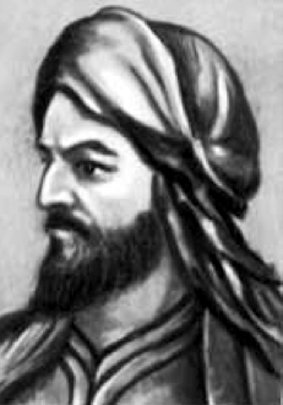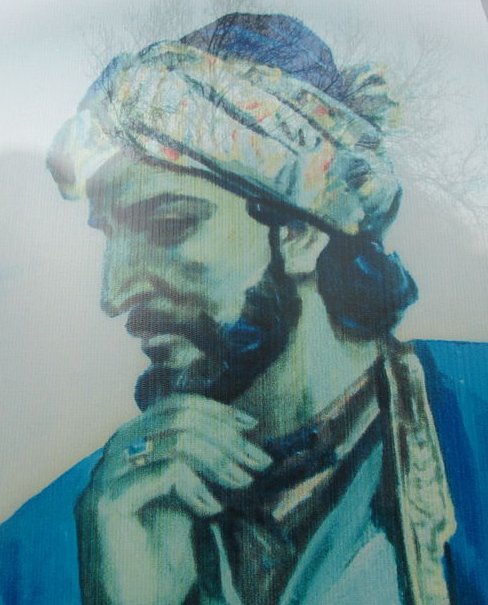Khagani Shirvani
One of the first prominent representatives of epic poetry in the history of the Middle East is Masah al-Iraqi, a famous philosophical magazine called Madain Kharababi, and another famous companion called Ghassid-shirniyya, written by Khagani. His tale and lamentations, called "The Nation," featured feudal acts, harsh accusations against oppression and injustice, and screaming. Highly appreciating human dignity, generosity and creative work Khagani Shirvani was a patriotic poet.
The poet, whose works spread in the Near and Middle Eastern countries, attracted the attention of his contemporaries, has always suffered in the life of the palace, which did not remain intact for his literary heritage. His works are also important not only for his artistic qualities, but also for learning the socio-economic conditions of the era.Afzaladdin Khagani Shirvani in the history of Azerbaijan
The poet, who wrote the first epic poetry in our poetry, as well as philosophic writers, was included as a courageous man in the palace's life, despite being a poet.
He was born in Shamakhi, the capital of the Shirvanshahs state. At that time Shamakhi was known as a science and culture center in the region and generally in the Muslim East. Local and foreign scholars and writers were teaching in Shirvanshah's palace or madrasah. The famous scholar of the period of Afzaluddin, who lost his father at the age of 8, and his uncle, Kafibeddin Omar bin Asma, grew up with his upbringing. His nephew informed him of the basics of his scientific knowledge at that time, and he expressed his enthusiasm for reading.

Afzaluddin has been eager to write poems from her young age. He wrote his first poems in the style of the famous Eastern poet Sena. Interestingly, the first poems written by Afzaliddin in the pseudonym of Haggaiwi gave him a reputation among the people. As a result, in 1151, when the poet was 25 years old, the head of the poet's council, Abul-Ula Ganjavi, invited him to the palace. At that time, the palace poets did not lose sight of the financial need, and all their needs were paid out of the treasury. Instead, they themselves
their rulers should have adhered to all their actions. There were very few rulers who would give them freedom to engage in creative activity without harming the palace poets. Afzaluddin, who is aware of all this, comes to the palace. Not long ago, she became friends with Abul-Ula Ganjavi, married her daughter and wrote her poems under the pseudonym of Khagani. The pseudonym given to the sorcerer showed his belonging to the ghagan, that is, the Shirvanshah.
Khagani Shirvani has created high artistic samples in all genres of classical Eastern poetry. Famous Oriental Poets Rashideddin Vatvat, Eccikati Esiraddin and Abdurrazzaq Isfahani and others spoke about the poetry talent of the young man who came to the palace of Shirvanshahs and went on to poetry with him. In 1156, the Khagani road to Mecca was visited by many Middle Eastern countriesin their countries. After returning from the trip, Hagani was considered to be one of the first outstanding examples of epic poetry in Middle Eastern literature.

He wrote his contribution, "Contribution to the Iraqi-Iraqi". The poet portrays the impressions of his trips to the Middle East peoples, along with his travel adventures. Khagani gave detailed information about himself, his real-life and his family here.
In the famous philosophical magazine "The Hagia's Heroes", in the history of the castle of the castle of the Sassanids, "Tagi Kaşra"
suggested that the palaces, which were repressed with cruelty, would be demolished, and urged their contemporaries to take lessons from this ruined palace. Of course, it was unexpected that the poet's poet wrote such poems.
In another popular episode, "Gospel-tinia," the poet praised human dignity, generosity and creative work. And in the time of Khagani,as well as more than a dozen other Middle Eastern and Middle Eastern poets, have written poems to this philosopher.Hagani's lyric poems, especially ghazals, which elevate human morality, praise pure love, love, fidelity and devotion, are remarkable. In Khagani's lyrical ghazals, it also reflects public issues. It's a seriespoems of the poet, from the oppressive rulers,
He boldly stated that the aristocrats and the scholars were in error. The continental and rabbis of Khagani is of great importance in understanding the poet's internal excitement and the attitude to the social environment. In these works, he tried to reflect the events of the poet in real terms, and in his poetic language, he hated the palaces, the proximity to the people and the shedding, not the Khagani, but the Khalqi.
Khagani Shirvani is a patriotic poet. She praised her homeland as Shirvani, a charming land of abundance, abundance, blessed land, poets' lodge. Sometimes, complaining of the oppressive shahs and nadans, Shamakhi was in the narrow cage, dark
Although he is known as a dungeon, he has always lived in his native country, where he has always been in the wilderness. The beautiful scenery of the homeland, its deep socio-educational activities and philosophical views are vividly reflected in its works. The Khaganites were courageous and cruelly persecuted the tyranny and arbitrariness of feudal lords and public injustice.
Khagani's literary heritage is very rich. His recollections and lamentations are also important in his creative work. He expressed his sorrows and infinite sadness in his lamentations, when he cried out in "prisons" that he was a cruel accusation against feudal aggression and oppression. In his lamentations on the death of his 20-year-old son Rashid, the poet's soul shock, suffering and suffering, and his resemblance to life are particularly effective and gentle. Khagani was also a talented boy. The writings of the contribution to the "Contribution to the Iraqi-Iraqi" and the famous letters to the famous people of the period draw their attention with the complex artistic expression, emotions, emotions and exaggeration.
When he was dissatisfied with the life of the hypocritical palace in Khagani, he regretted his writings. The poet, who was exposed to the unfair attacks of the evil palace poets, who felt himself in the palace as "a winged iron bird," decided to turn away from the palace. For this reason, he asked for a re-visit, but his request was denied. Khaqani sought to escape from Shirvan, but was arrested on the orders of IA Akhsita and settled in Shabran fortress in 1170. After being released for 7 months, the poet finally left Shirvan with his family in 1173 and moved to Tabriz and lived there until the end of his life.
Many prominent poets from the Near and Middle East (Amir Khosrov Dehlavi, A.Cami, Abulgasim Shirazi, Emir, Qaani and others) named Khagani Shirvani as their master, and wrote poems to his works. His works have been repeatedly published in Iran and India. His creativity has attracted the attention of researchers since XIII century, and has been described as a great poet in all the East.
Khagani Shirvani died in Tabriz in 1199 and was buried in the Surkhab cemetery near Tabriz, later known as "Mysterious Thoughts" ("Place of poet's burial").
Posted from my blog with SteemPress : https://yasasteemit.000webhostapp.com/2018/10/khagani-shirvani